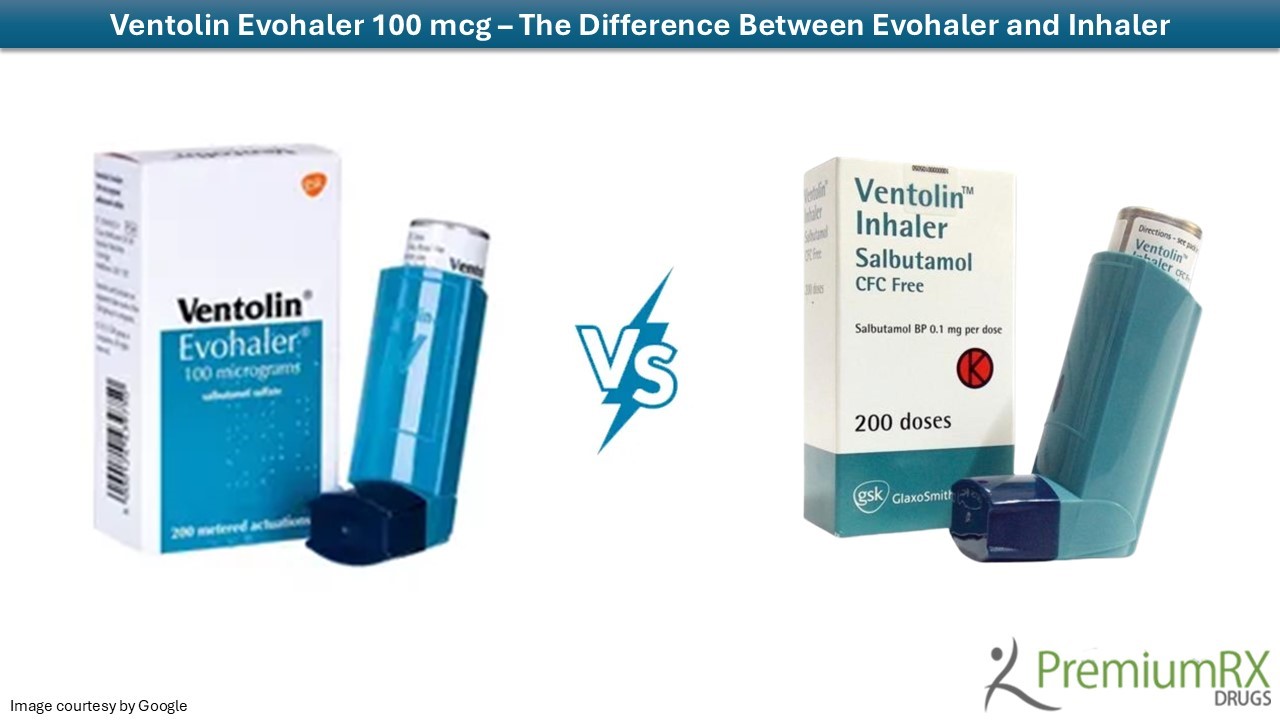Ventolin 100 mcg Evohaler is a type of metered-dose inhaler (MDI). Ventolin hydrofluoroalkane (HFA) is widely used to treat or prevent bronchospasm, as well as swollen or narrowed airways in the lungs. People with asthma or certain types of chronic obstructive pulmonary disease (COPD) are recommended Ventolin Evohaler, which contains the active component Salbutamol. Salbutamol is sold under the Ventolin brand, among others.
Ventolin inhaler is a CFC-free reliever that gives you quick relief from breathing problems. It is recommended for adults only, but children above 12 years should consult a doctor to understand the usage of Ventolin Evohaler 100 mcg and its possible effects on their health.
The difference between Evohaler and Inhaler
Evohaler and inhaler are often used interchangeably, but there is a basic difference between these two product terms. Inhalers are specifically designed devices that deliver medication into the airways via inhalation. Such inhalers are offered in various forms, like PMDI (puffer inhalers) and dry powder inhalers. On the other hand, Evohaler is a brand name for specific inhalers, such as pressurised metered-dose inhalers (pMDI) containing Salbutamol, a short-acting beta-2 agonist used to treat asthma and other airway conditions.
How does Ventolin Evohaler 100 mcg work
Ventolin Evohaler releases a dose of Salbutamol into the lungs. Salbutamol belongs to a class of medicines called fast-acting bronchodilators, also known as selective beta-2 adrenergic agonists. It relaxes and opens airways to improve breath and strengthen airways. This medicine can effectively help relieve chest tightness, continuous coughs, and wheezing.
Benefits of Ventolin Evohaler 100 mcg
Salbutamol helps the airways connect the lungs to stay healthy and open, making it easier for air to get in and out. This medicine relieves you by preventing asthma and managing other triggers of shortness of breath and asthma symptoms. If you experience breathing problems with some triggers like pollen, animal dander, chemical smoke, and pollen, this Evohaler can make breathing easier when used per doctor’s instructions.
Usage methods of Ventolin Evohaler 100 mcg
Ventolin Evohaler releases a fine mist that you can directly inhale through your mouth into your lungs. You have to use this inhaler correctly. In this regard, you can ask your doctor or pharmacist for assistance. Usually, an Evohaler canister delivers 200 puffs. Take the frequency of puffs as directed by your doctor.
In most cases, one puff is sufficient to relax bronchial tubes, but in some cases, the patient needs higher doses to relieve breathing shortness. Patients should consult a doctor to review their asthma treatment and medication course.
If you are prescribed to use a Ventolin Evohaler 100 mcg to treat lung inflammation every day, it is important to continue taking this medicine regularly for some more days, even if you feel better. Follow your doctor’s instructions about administering this inhaler to understand how many puffs to take and how often to use it.
For new users, it is important to test the inhaler device to check if it is working properly. Such users should remove the mouthpiece cover gently by squeezing the sides with their thumbs and forefingers. Also, make sure to shake it well, point the mouthpiece away from you, and press the canister to release two puffs into the air. To use it properly, just put the mouthpiece in your mouth between your teeth. Close your lips around it and then pump it. Keep your mouth closed for a few seconds, and then gently breathe out. If you have not used the device for 5 days or more, it is advised to shake it well and pump it in the air before inhaling the medicine.
Side effects of Ventolin Evohaler
This inhaler should be used in the prescribed dose, frequency, and duration. There are some rare but possible side effects of this inhaler, including:
- Wheezing
- Choking of breath
- Chest pain
- Dizziness
- Upset stomach
- Fast heart rate or pounding heartbeats
- Experience of fluttering in the chest
- Acute headache
- Numbness or tingling
- Pain or burning when you urinate
- Increased thirst and increased urination
- Dry mouth
- Sleep disturbances
- Vomiting
- Sinus pain, runny or stuffy nose
- Cough and sore throat
Rare side effects include a low level of potassium in your blood and increased blood flow to your extremities (peripheral dilatation). On the other hand, extremely rare side effects are changes in sleep patterns, restlessness, and excitability.
Call your doctor if any of these side effects occur continuously or persist with you for a long time.
Latest posts by Marie (see all)
- Tadalafil vs Sildenafil vs Vardenafil: Which One Lasts Longer? - February 21, 2026
- Vaniqa vs Generic Alternatives: Best Options for Unwanted Facial Hair Removal - February 20, 2026
- Does medication improve sleep? - February 18, 2026




